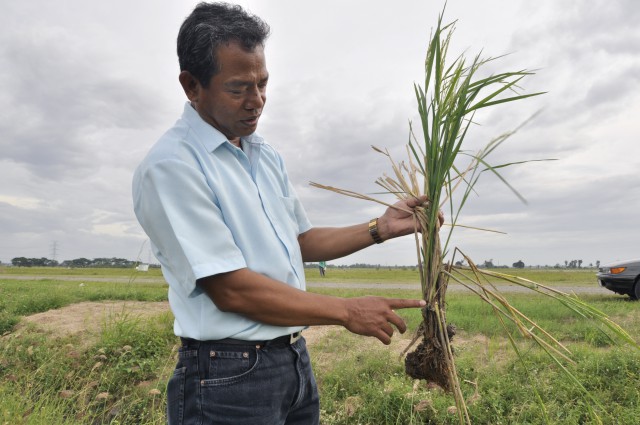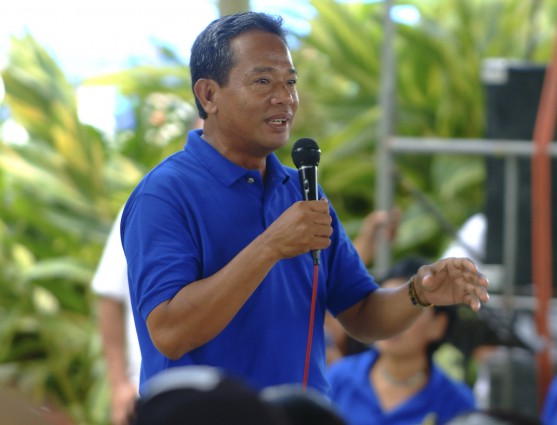
Becoming an agriculturist was not Ruben Balagtas Miranda’s (a.k.a. Sir RBM) childhood dream. Yet, he grew to love the profession that made him serve the rice farmers for a lifetime.
Sir RBM barely knew anything about farming prior to entering the university. What he did was to follow the footsteps of his sister.
“My elder sister was an agriculture graduate, and I saw that she was doing well in her job. When it was time for me to decide which program to take, agriculture was in demand, and the school offering the course, the Central Luzon State University, was just a few kilometers away from our house,” he shares.
In no time, Sir RBM managed to acquire a bachelor’s degree in Agriculture, major in Crop Protection, and minor in Agronomy.
A good and faithful servant
Sir RBM started his 35-year stint in public service at the Philippine Cotton Corporation in San Juan, Ilocos Sur, as an entomologist, then as chief of its production and extension unit. He remained there for 9 years, until he availed of its retrenchment program, hoping he could go back to his hometown.
Upon returning, Miranda invested in rice-cotton farming over a 2.5 ha land that he bought using his separation pay.
His journey in PhilRice came a year later after he witnessed its establishment. “They were starting to construct PhilRice then, and I saw that it was good. I immediately asked some colleagues if I could apply here. My 26 years of service in the rice industry began right there and then,” Miranda narrates.
As an expert in rice integrated management, rural development, and extension, Miranda led various projects under the Technology Management and Services Division.
In his earlier years at PhilRice Technology Transfer Program, he was part of the Sustainable Rice Farming program where he handled the Integrated Pest Management component. The program beneficiaries were members of people’s livelihood foundations. He also served as one of the pre-program specialists coordinating and facilitating several batches of the Rice Specialist Training Course at PhilRice . He also served as rice expert for Rural Development and Rehabilitation Project in Cambodia from 1996 to 2000 where he had the chance to help farmers in Cambodia improve their rice farming practices. As a result, their yield increased from 700kg/ha to 1.8 tons/ha, using their own traditional varieties.
Sir RBM has assisted farmers in organizing themselves through the Partnership for Agricultural and Rural Transformation Project. Presently, these organized farmers operate as full-fledged cooperatives in Nueva Ecija, Negros Occidental, Agusan del Norte and Agusan del Sur.
He also led the implementation of TCP3 for the Development and Promotion of Location-Specific Integrated High-Yielding Rice and Rice-Based Technologies in 2005-2009. As an off-shoot of the project, the Location-Specific Technology Development Program, one of the flagship programs of the Institute from 2010 to 2012 was implemented nationwide. While doing this, Sir RBM was appointed as PhilRice’s Acting Deputy Executive Director (DED) for Development where his office participated in the implementation of the “Small Scale Irrigation Project” and collaborated with IRRI for the training of African extension workers in the country. He also pushed for strong partnership with the DA-Regional Field Offices.
During his term as DED for Dev’t, Sir RBM was also appointed as Officer-in-Charge of PhilRice. He played the part for 4 months while waiting for the next Executive Director of the Institute.
Returning to his task as a development worker, Sir RBM focused on projects involving upland rice farmers and their traditional rice varieties. He became the lead of the DA-Upland Rice Development Program (2012-2016), and the Heirloom Rice Project (2014-2016, now continuing on its second phase).
Aside from these, Miranda also implemented several PCARRD-funded projects following the transformational models, Science and Technology-Based Farm (STBF), Science and Technology, and Community-Based Farm (STCBF), and the Science and Technology Model Farm (STMF).
He is also a member of the technical working group for the Good Agricultural Practices (GAP) that produced the technical content of the Philippine National Standards (PNS) of rice production.
Joy in service
As a good and faithful extensionist, Sir RBM has been given reasons to celebrate his call of service.
In 2000, He earned the Medal Sahametrei order “de Chevalier,” Cambodia’s second highest award for outstanding contribution in rural development.
At PhilRice, he was awarded as the Outstanding Development Specialist in 1994 and the Outstanding Public Official in 2007.
He was also awarded the CSSP Achievement Award in Extension during the FCSSP 22nd National Scientific Conference in Pearlmont Inn, Lim Ket Kai Drive, Cagayan De Oro City on March 11-16, 2013.
He also won numerous best paper and poster awards for his work on rural development and extension.
35 years and more
Sir RBM hopes that the Institute continues to develop extension models and strategies that can work for extension workers and farmers. He also longs for a strengthened partnership among all implementing agencies. On top of it, he dreams of food-sufficient family table.
“Implementing a project is never easy. Every time you work, you have to bear in mind your objectives and how you could contribute in achieving the mission of your institution. I hope the next generation of development workers and researchers remain true and loyal to the work they are tasked to do,” he shares.
At 62, Miranda is ready to leave his professional life, but his service for the rice farmers will remain in his day-to-day system.
“Life after retirement will still be about agriculture. I would like to become a full-time farmer. I want to continue helping organize farmers so they could form themselves into cooperatives; for instance, mentoring the next generation of extensionists; and engaging in agriculture-related activities,” he shares.
Sir RBM says he is always willing to help PhilRice in any way possible.
For his 35 years in government service, Sir RBM only has this to say: “I will forever be grateful to all—to PhilRice most especially”.





